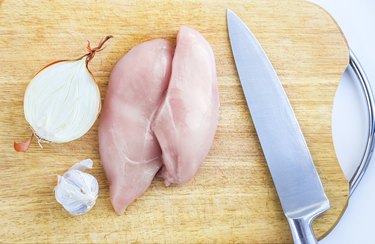
Baked marinated chicken breasts are a delicious, healthy main dish option to accompany a salad or nutritious sides. Marinades partially tenderize the meat and add flavor, which can vary with the choice of spices, herbs and liquid ingredients.
Tip
To cook marinated boneless, skinless chicken breasts in the oven, prepare a marinade made of oil, acid and spices. Steep the chicken in it for 20 minutes in the refrigerator, and then bake for about 15 minutes in an oven preheated to 375 degrees Fahrenheit.
Video of the Day
Marinated Chicken Breast in Oven
This recipe for baked marinated chicken, which serves six, is from the Mayo Clinic. It shows how easy the dish is to prepare.
Video of the Day
Ingredients:
- Six 4-ounce chicken breasts
- 1/2 cup balsamic vinegar
- 1 tablespoon olive oil
- 2 tablespoons brown sugar
- 1/4 teaspoon dry mustard
- 1 teaspoon chopped fresh thyme
- 1 tablespoon paprika
- 1/2 teaspoon kosher salt
- 6 tablespoons crumbled feta cheese
Directions:
- Heat oven to 375 degrees Fahrenheit.
- Lightly coat a baking dish with olive oil.
- In a bowl, combine the chicken with all the ingredients except for the feta cheese.
- After the chicken is coated with the mixture, marinate it in the refrigerator for at least 20 minutes.
- Place the chicken on the baking dish and bake for 15 minutes or until its internal temperature reaches 165 degrees Fahrenheit.
- When done, sprinkle with feta cheese and serve.
Nutrition per serving:
- Serving size: one chicken breast
- Calories: 279
- Total fat: 15 grams
- Saturated fat: 4 grams
- Trans fat: 0 grams
- Monounsaturated fat: 6 grams
- Cholesterol: 79 milligrams
- Sodium: 337 milligrams
- Total carbohydrates: 9 grams
- Dietary fiber: 1 gram
- Total sugars: 8 grams
- Protein: 25 grams
All About Marinades
According to the USDA Food Safety and Inspection Service, the term "marinate" means to steep food in a sauce made of a cooking oil like olive oil; an acid, such as wine, vinegar or lemon juice; and spices. The oil adds moisture, while the acid breaks down the tissues of the meat, which tenderizes it and makes it juicier.
In general, use ½ cup of marinade per pound of meat. Many prepared marinades are high in salt, but you can make your own. The flavor depends on the ingredients, and variations are seemingly endless. Honey, brown sugar or molasses impart sweetness; hot sauce adds spiciness; and yogurt provides tanginess.
When making a chicken breast marinade for baking, it's interesting to experiment with the spices of different cultures. For example, cumin and chili powder offer a Mexican flavor, and soy sauce, garlic and ginger add an Asian flair. When in a hurry, Italian dressing is a great ready-made option.
Safety Guidelines for Marinating Chicken
Take a few precautions when marinating chicken to avoid becoming ill with a foodborne bacterial infection. To prevent cross-contamination, don't put cooked chicken on a dish that was used for raw chicken.
FoodSafety.gov suggests marinating chicken in a plastic bag, and discarding the bag after use. A glass container makes an appropriate alternative marinating container, says Michigan State University. Don't use a metal dish because the acid in the marinade will interact with it and produce a harmful chemical.
Instead of marinating chicken on the counter, always put it in the refrigerator in a covered container. You may safely marinate chicken in the refrigerator for up to two days.
Never reuse a marinade that has been in contact with raw poultry unless you boil it first to destroy the bacteria. If you'd like to use some of the marinade as a sauce, it's best to set some aside for this purpose before it comes in contact with the raw meat.